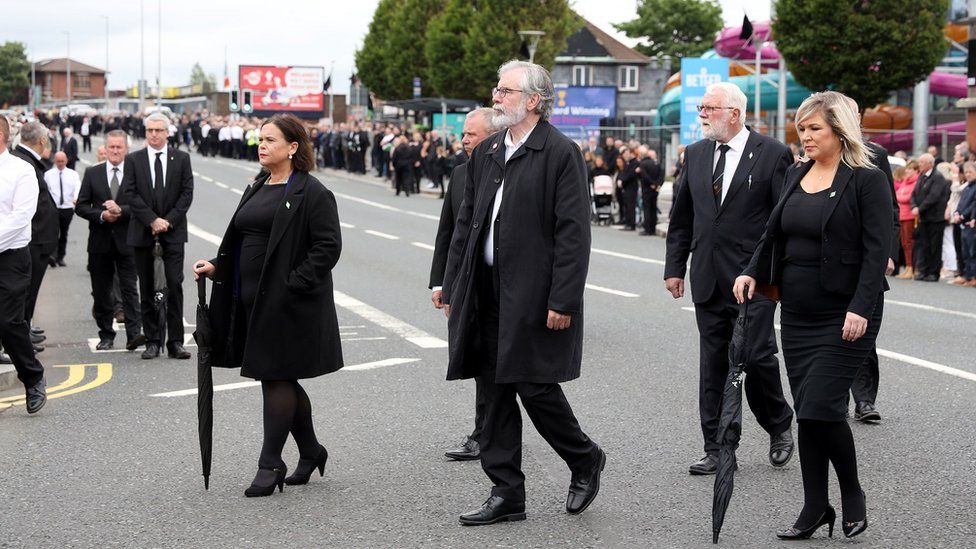Covid Inquiry: Missing notes from executive meeting after Storey funeral found
- Published

Sinn Féin's leader and deputy leader attended Bobby Storey's large-scale funeral in June 2020, along with former leader Gerry Adams (centre)
Notes of the first Executive meeting after a controversial funeral, which were thought to have been missing, have been submitted to the Covid Inquiry.
Counsel for the UK Covid-19 Inquiry, sitting in Belfast, said seven attempts were made to source the minutes from 2 July 2020.
The meeting followed the large-scale funeral of republican Bobby Storey.
Then-deputy first minister Michelle O'Neill and other Sinn Féin ministers had attended the funeral.
They faced criticism from other parties who said the gathering was in breach of Covid lockdown restrictions.
Despite being told that handwritten notes of this meeting were missing and had not been provided, at the start of Friday's hearing Clair Dobbin KC said the minutes had been found.
'Surprise'
Ms Dobbin said that shortly after the opening of Module 2C of the inquiry, the inquiry team had been approached by The Executive Office to say they had the minutes of the 2 July meeting.
Bobby Storey was previously chairman of Sinn Féin and a close friend of Gerry Adams
A letter sent to the inquiry on behalf of The Executive Office was shown saying: "It is correct that those notes were submitted to the inquiry following counsel to the inquiry's comment in her opening submission on the inability of TEO [the Executive Office] to find them".
The email said that comment had come as a surprise to members of the TEO Covid Inquiry Team as they believed notes had been provided to the inquiry.
Ms Dobbin said she wanted to put the suggestion that it came as a surprise into some context for the inquiry and detailed all of the requests that were made of The Executive Office for the missing notes.
The counsel to the inquiry said there had been repeated requests for these notes and accepted in a letter dated 31 July 2023 that it was the inquiry's understanding that the notes of 2 July 2020 were not held.
The inquiry again set out that this set of notes covered "a period of significant interest" and that it was "of concern" if they were missing.
It asked for confirmation that these handwritten notes were missing and that there were no copies.
It also asked for an explanation about the circumstance in which they had gone missing and whether there was an investigation into this.
The inquiry heard there were investigations around this time around the missing notes.
'Not a happy picture'
On Friday, an email dated 3 August 2023 was shown to the inquiry which confirmed that the handwritten notes for 2 July 2020 had been found.
Ms Dobbin said that "despite those notes having been found and despite the sheer number of requests having been made, despite the fact that TEO told the inquiry that those notes weren't held and despite the very specific questions that the inquiry asked about the precise circumstance in which notes like this could go missing, they weren't provided until after the opening had been given".
Baroness Heather Hallett, who is chairing the inquiry, said she was "very concerned" about what she had just been told and said she would consider with the inquiry team whether she wished to pursue the matter further.
"It's not a very happy picture," she concluded.
On Friday afternoon, the head of the Northern Ireland Civil Service said it was "regretful" information that is of importance to bereaved families was deleted.
Jayne Brady was answering questions about information being deleted from ministers' devices including WhatsApp's on mobile phones.
Jayne Brady gave evidence at the Covid Inquiry on Friday
She told the inquiry the issue had "shone a light on the vulnerabilities of the system" that is 20 years old.
Ms Brady said it was "a matter of deep regret" that the same issues had been raised during the Renewable Heat Incentive (RHI) inquiry.
She said she welcomed that "we're hearing it now because it shows the journey that we still need to travel".
'Apparent lack of urgency'
The inquiry also heard that it was not until 17 March that a strategic plan was drawn up which brought together cross-departmental strategies to aid decision making.
Karen Pearson, who had moved from working on project Yellow Hammer, related to Brexit, to preparing for the pandemic, said she accepted she had little experience in the area of health.
The UK Covid Inquiry heard that in early March 2020, senior Northern Ireland civil servants conveyed their concerns over a lack of response structure and staff and that the Northern Ireland contingency hub should be "established as a matter of priority".
Asked by counsel to the inquiry about the apparent lack of urgency among some people in early March, Ms Pearson said she was aware of the concern but the hub had been set up a few days later.
At that point, counsel to the inquiry, Clair Dobbin, KC, reminded Ms Pearson that it took several more days before the Covid hub was activated.
Ms Pearson was also asked if the cross-community veto in the assembly was ever intended to be used in a public health arena, to which she replied: "I doubt it was."
- Published3 May
- Published2 May
- Published3 days ago